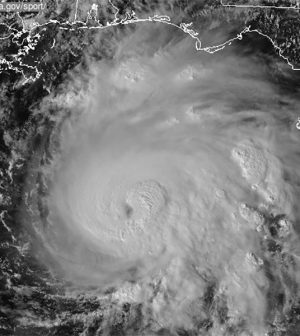- Could Your Grocery Store Meat Be Causing Recurring UTIs?
- Are You Making This Expensive Thermostat Error This Winter?
- Recognizing the Signs of Hypothyroidism
- 10 Strategies to Overcome Insomnia
- Could Artificial Sweeteners Be Aging the Brain Faster?
- Techniques for Soothing Your Nervous System
- Does the Water in Your House Smell Funny? Here’s Why
- Can a Daily Dose of Apple Cider Vinegar Actually Aid Weight Loss?
- 6 Health Beverages That Can Actually Spike Your Blood Sugar
- Treatment Options for Social Anxiety Disorder
Post-Hurricane Period Is Dangerous for People With Dementia

Hurricanes not only disrupt the communities they affect, they also pose an increased risk of death for people with dementia.
This heightened risk could owe to disruption in their normal routines, changes in their living environment or even changes in access to caregiving or medications, a University of Michigan researcher said.
“The important message is that older adults with dementia have unique needs, most notably that during a disaster they are almost entirely dependent on caregivers due to their lack of awareness of the crisis,” said lead author Sue Anne Bell, an assistant professor of nursing.
“I think if anything, there is new attention to the needs of older adults during a disaster, and this study is one of an emerging body of evidence that is working to better support the needs of older adults before, during and after disasters,” Bell said in a university news release.
To study this, her team looked at counties in U.S. states affected by Hurricanes Irma, Harvey and Florence. In the year before and the year after the storms, there were more than 54,000 deaths in a combined population of more than 346,000.
Researchers analyzed risk for death, but not actual increases. The findings don’t give a precise number of deaths owing to hurricane effects.
They found that the risk of death was highest among people ages 85 and older with dementia — up 9% more compared to other adults in that age group.
The study found that older adults who were enrolled in both Medicare and Medicaid had an 11% increased risk for death.
The risks for people who moved after the storm remained.
Among people with dementia, the percentage of deaths attributed to hurricane exposure ranged from 10.9% for Hurricane Harvey to 6.2% for Hurricane Irma.
Deaths peaked about three to six months after Hurricanes Irma and Harvey. This suggests the increase owed to factors other than immediate harms of the storm, researchers said. These factors could include lack of health care access and changes in normal routines.
These findings have the potential to affect many people. More than 7 million U.S. seniors had dementia in 2020, according to Population Reference Bureau estimates.
Dementia is projected to affect more than 9 million Americans by 2030 and nearly 12 million by 2040.
Meanwhile, disasters are expected to increase with worsening climate change.
“There is so much more that needs to be studied here that could help inform us about being ready for disasters,” Bell said. “Studying how caregivers have prepared, whether people evacuated, what type of response capabilities their community had — would potentially influence the impact of the disaster on this group of older adults.”
Bell hopes the study will raise awareness about the special needs of people living with dementia during disasters. She called for an integrated approach to preparedness and response that includes local, state and federal responders, health care regulators and policymakers.
Study findings were recently published in JAMA Network Open.
More information
NASA has more on hurricanes in a changing climate.
SOURCE: University of Michigan, news release, March 13, 2023
Source: HealthDay
Copyright © 2026 HealthDay. All rights reserved.










